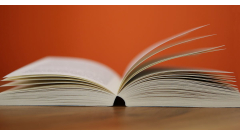Welcome to your indispensable guide on enhancing your vocabulary through the power of flashcards! With the help of Merriam-Webster's Dictionary, we're about to embark on an exciting journey to transform the way you learn new words. Whether you're studying for a test, preparing for a presentation, or simply looking to enrich your language skills, this guide is designed for you. Flashcards not only offer a fun way to memorize definitions but also help you grasp the nuances of word usage, courtesy of one of the most trusted names in language.
By using Merriam-Webster's Dictionary as our foundation, you'll access a treasure trove of expertly curated vocabulary that will elevate your word game. Each flashcard can become a stepping stone toward fluency and confidence in your verbal abilities. So, let’s dive into the creative process of crafting these learning tools that will stick with you long after your study sessions are over!
Merriam-Webster's Dictionary is a comprehensive and authoritative resource that brings clarity to the English language. It offers a wide range of words, definitions, and usage examples, making it an essential tool for anyone looking to improve their vocabulary. Whether you're a student, a professional, or simply someone eager to expand their linguistic skills, this dictionary ensures that you have access to precise meanings and context-rich information to enhance your understanding. With its user-friendly format and in-depth coverage, Merriam-Webster’s Dictionary stands out as a valuable companion on your vocabulary-building journey.
Selecting Vocabulary Words
Identifying the right vocabulary words is crucial for effective flashcard creation when using Merriam-Webster's Dictionary and Thesaurus. Start by considering words that commonly appear in your daily conversations, academic settings, or subjects of interest. Utilize the dictionary’s extensive list and search functions to discover words that stand out due to their frequency or relevance. You may want to focus on words that enhance your communication skills or enrich your understanding of specific themes, such as literature, science, or technology.
Additionally, think about the varying levels of difficulty associated with the words. Creating a balanced set of flashcards that includes both familiar and challenging terms can aid in gradual progression. Organizing words into categories, such as “everyday vocabulary,” “academic terms,” and “specialized language,” will facilitate easier recall during review sessions. This structured approach will elevate your learning experience, allowing for more focused and purposeful study.
- Utilize synonyms and antonyms from the thesaurus to expand your vocabulary breadth.
- Consider personal interests—select words that resonate with your passions or hobbies for a more engaging learning process.
Designing Flashcard Layouts
Creating effective flashcards for vocabulary building using Merriam-Webster's Dictionary and Thesaurus involves thoughtful design to enhance memorization and recall. Start with a simple layout that prioritizes clarity and ease of use. On one side of the flashcard, prominently feature the vocabulary word in large, bold letters. This immediately grabs attention and allows for quick recognition. Consider using a contrasting color for the text to make it stand out even more.
On the flip side, provide essential information that aids comprehension. Write the definition clearly, ensuring that it is straightforward and accurately reflects the meaning found in Merriam-Webster's Dictionary. Include the part of speech to contextualize the word’s usage, which is critical for understanding its role in sentences. Finally, add an example sentence to illustrate the word in action; this not only reinforces the meaning but also helps learners see how to use it effectively. Utilize legible fonts and spacing to make the text visually appealing and easy to read.
- Use high-quality cardstock for durability.
- Add color coding for categories (e.g., verbs, nouns).
- Incorporate small icons or images to create visual associations.
Incorporating Visual Aids
Enhancing your vocabulary-building flashcards with visual aids can significantly improve retention and understanding of new words when using Merriam-Webster's Dictionary and Thesaurus. Incorporation of images or symbols related to each word helps create lasting associations in your memory. This strategy engages multiple senses, allowing you to create mental images that reinforce the definitions. Begin by identifying the key vocabulary words you wish to learn and consider what symbols or images convey their meanings effectively.
When selecting visual aids, think about your own experiences and what resonates with you. You can either draw your own illustrations that encapsulate the essence of the word or search online for images that accurately represent the concept. Be creative! For example, if you're working on the word "serene," find a peaceful landscape photo or depict it with calming colors. Additionally, consider the following actions:
- Print images from stock photo websites or use free image databases.
- Use printouts from online visual dictionaries for reference.
- Create collages or simple sketches combining multiple elements associated with the word.
- Experiment with color-coding different categories of words and their respective visuals for easier recollection.
Utilizing Synonyms and Antonyms
Creating a set of flashcards using Merriam-Webster's Dictionary and Thesaurus can significantly enhance your vocabulary skills. One of the most effective strategies for vocabulary building lies in the incorporation of synonyms and antonyms. For each vocabulary word, identify a synonym, a word with a similar meaning, and an antonym, a word that means the opposite. This not only broadens your understanding of the word but also provides context for its use in different scenarios.
Begin by selecting a vocabulary word from your list. Look up the word in Merriam-Webster’s Dictionary, noting its definition and usage. Proceed to the thesaurus section to find at least one synonym and one antonym. For example, if your word is ‘happy’, a synonym might be ‘joyful’ and an antonym could be ‘sad’. Create a flashcard with the following structure:
- Front Side: Vocabulary Word (e.g., Happy)
- Back Side:
- Definition: Feeling or showing pleasure or contentment.
- Synonym: Joyful
- Antonym: Sad
This method provides a multi-faceted approach to learning. You can also reinforce your understanding by using each word in a sentence to see how the synonym and antonym alter its meaning:
- Using 'happy': She felt happy when she received the good news.
- Substituting with the synonym: She felt joyful when she received the good news.
- Using the antonym: She felt sad when she heard the bad news.
Engaging with the content actively through flashcards enables deeper retention and comprehension. As you develop your collection, continue to explore words that intrigue you, noting their synonyms and antonyms as part of the process.
Creating Themed Flashcard Sets
To enhance your vocabulary-building experience with Merriam-Webster's Dictionary and Thesaurus, consider creating themed flashcard sets. This method organizes your learning process and provides focused study sessions tailored to specific contexts or topics. For instance, you can develop a flashcard set around 'Travel' by selecting terms and phrases relevant to journeys, accommodations, and experiences associated with exploring new places. Each card could feature the word on one side and its definition, part of speech, and an example sentence on the other side, allowing for immersive learning.
Additionally, you can create sets for different subjects like 'Emotions' or 'Academic Terms.' For the 'Emotions' set, include words that describe feelings such as elated, anxious, or melancholic, complete with contextual sentences that highlight usage. This thematic approach not only aids in memorization but also helps you understand the nuances of vocabulary within particular situations, making your studies more relatable and impactful.
- Choose a specific theme for each flashcard set.
- Include definitions, parts of speech, and example sentences.
- Consider using visuals or mnemonic devices to enhance memory retention.
Incorporating Spacing Techniques
Creating flashcards for vocabulary building using Merriam-Webster's Dictionary and Thesaurus is an effective way to enhance your language skills. To maximize retention, employ spaced repetition—a technique that ensures you revisit information at strategically increasing intervals. This involves first reviewing your newly created flashcards soon after you've made them to reinforce your memory. Then, as you feel more familiar with the words, gradually increase the time between review sessions. For example, you can start by reviewing the flashcards daily, then moving to every two days, then weekly, and finally monthly for long-term retention. Establishing a systematic review schedule aids in solidifying the vocabulary you've learned in a lasting way.
Utilize digital or physical calendars to plot specific days for your flashcard reviews, helping you keep track of when to engage with each set. Adding reminders on your mobile device can ensure you stick to this schedule. Set aside focused time for these sessions, allowing undistracted engagement with the vocabulary. Some tips for effective spaced reviews include:
- Group related words together for thematic studying.
- Rotate through different sets of flashcards to maintain interest.
- Test yourself with the flashcards—both recalling meanings and constructing sentences using new vocabulary.
- Keep assessing your comfort level with each word and adjust your review intervals accordingly.
Self-Testing Techniques
When using Merriam-Webster's Dictionary and Thesaurus for vocabulary building, integrating self-testing techniques can significantly enhance your retention and understanding of new words. One effective method is to create flashcards that include definitions and example sentences derived from the dictionary. After preparing your flashcards, regularly quiz yourself. Shuffle the cards to ensure you are not memorizing the order. As you attempt to recall the meaning of each word without flipping the card, it not only engages your memory but also reinforces the word's significance in various contexts. Once you check the definition and example sentences after flipping the card, take a moment to absorb the information. This approach helps in making connections and better retaining the vocabulary.
Tracking your progress is another crucial aspect of effective self-testing. Keep a log of the words you struggle with and those you remember well. You can categorize them into groups such as "mastered," "needs improvement," and "newly introduced." This not only helps you focus on your weaker areas but also allows for a more tailored learning experience. Furthermore, consider setting aside specific days for intensive review sessions to reinforce your learning. Use the following techniques to maximize your self-testing experience:
- Dedicate a few minutes daily to review various flashcards.
- Incorporate auditory learning by saying the words aloud.
- Create themed flashcards around specific topics for contextual learning.
- Invite friends or family to quiz you for added interaction and support.
Related Products
Engaging in Group Practice
Forming a study group can significantly enhance your vocabulary building efforts when using Merriam-Webster's Dictionary and Thesaurus. Gather a diverse group of individuals who share an interest in improving their language skills. During your sessions, utilize your flashcards for quizzing one another, which can make the learning process much more dynamic. Each member can take turns being the quizmaster, selecting flashcards and challenging others to either define the word, use it in a sentence, or describe its meaning based on context.
Encourage creativity by having group members share sentences or scenarios where the words might apply. This interactive approach is particularly effective in highlighting the nuances and different connotations of each word, facilitating deeper understanding. Engage in discussions around the meanings and the subtleties that can exist between synonyms found within the Merriam-Webster Dictionary and Thesaurus. Keeping sessions lively and inclusive is key to maintaining interest and retention.
- Establish clear roles for each session, such as quizmaster, definition explainer, and example creator.
- Incorporate games or competitions to make learning fun and engaging.
Tracking Progress Over Time
Creating flashcards for vocabulary building using Merriam-Webster's Dictionary is an excellent way to enhance your language skills, but tracking your progress over time is equally important to ensure continuous improvement. Start by maintaining a dedicated journal specifically for your vocabulary learning journey. In this journal, document the words you have mastered as well as those that give you trouble. Writing down your challenges allows you to focus your efforts on particular areas needing improvement, keeping your learning process efficient and targeted.
As you create your flashcards, include the definitions, synonyms, and example sentences directly referencing Merriam-Webster's Dictionary for accuracy. Dedicate a section of your journal to catalog new words you encounter during your reading or conversations. Regularly revisiting this catalog not only reinforces your learning but also boosts your motivation as you visually witness your vocabulary expansion.
- Record the date you learned each word.
- Note any patterns or themes in the words you've mastered.
- Reflect on your progress monthly to see how far you've come.
- Set specific vocabulary goals for short and long-term learning.
Reflecting on Usage Contexts
Creating flashcards for vocabulary building using Merriam-Webster's Dictionary and Thesaurus is not only about memorizing definitions but also about understanding how to use words in context. Once you've selected your vocabulary words, take a moment to reflect on how they fit into everyday conversations, writing, and specific scenarios. This deep reflection helps transform abstract definitions into practical knowledge. Write short paragraphs or scenarios that incorporate the new words, making them relevant to your life experiences. By doing this, you develop a more robust connection with the terms, which will ultimately improve your retention and application.
For instance, if you learn the word 'ubiquitous,' consider a context where it might be used. You might write, "Smartphones have become ubiquitous in contemporary society, found in the hands of young and old alike." This kind of contextualization not only solidifies the understanding of the word's meaning but also provides a template for using it correctly in future conversations or writing assignments. You can also create the following lists to enhance your flashcard effectiveness:
- Words with similar meanings for easier recall
- Examples of usage in sentences from respected sources
- Contextual scenarios where you might use the new word
Why We Chose This Product
Choosing Merriam-Webster's Dictionary for this guide was an obvious decision because of its reputation as an authoritative source for English language learners. The clarity and comprehensiveness of this resource complement the flashcard method perfectly, marrying practicality with reliability. It serves as not just a reference book, but a gateway to understanding the intricacies of vocabulary. With it, you are guaranteed the best starting point for creating informative and engaging flashcards.
- Widely respected and trusted
- Diverse word choices and definitions
- Accessible explanations for all levels
- Enhances overall communication skills
When combined with your creativity and commitment, this guide and the dictionary will empower you to build an impressive vocabulary that will truly resonate in your everyday conversations. Let’s get started on constructing the flashcards that will illuminate your learning journey!
Merriam-Webster's Dictionary is a comprehensive and authoritative resource that brings clarity to the English language. It offers a wide range of words, definitions, and usage examples, making it an essential tool for anyone looking to improve their vocabulary. Whether you're a student, a professional, or simply someone eager to expand their linguistic skills, this dictionary ensures that you have access to precise meanings and context-rich information to enhance your understanding. With its user-friendly format and in-depth coverage, Merriam-Webster’s Dictionary stands out as a valuable companion on your vocabulary-building journey.










